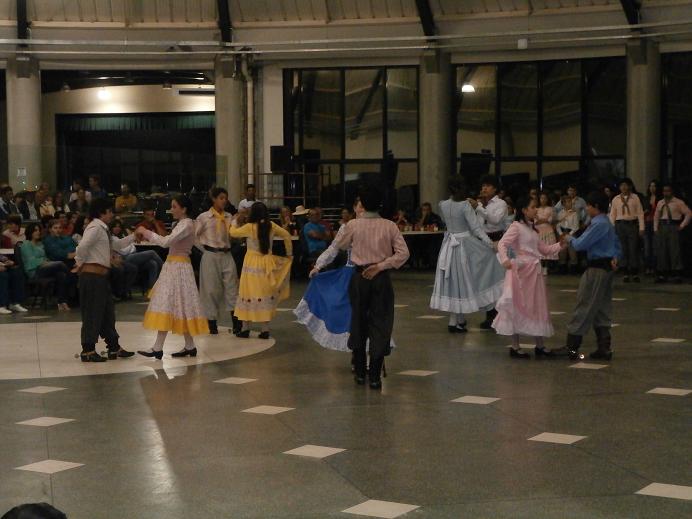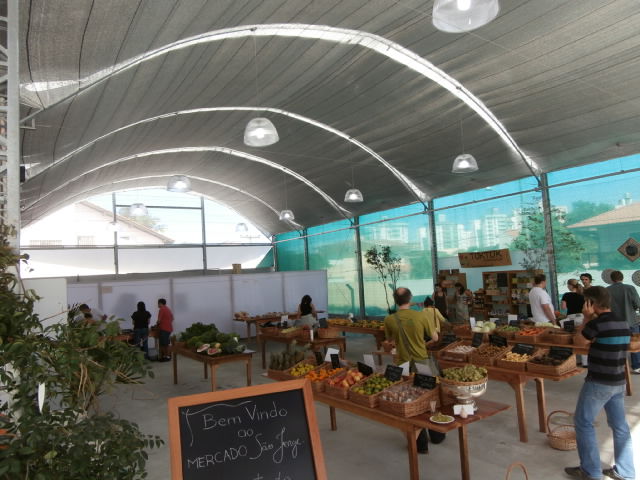I like the title, yesterday a guy gave me a fake dollar bill with this question "How much is worth your soul?".
'Do I want to participate to create a better world for tomorrow or just want to get rich today, not worrying about the future world of my chilren?'
Last week has been a very social engaged and activist week. Thanks to Luc Vankrunkelsven who I have been following for one week.
But first this: Do you know where the word "Brazil" comes from?
So on saturday 16/03 I was going to meet Luc Vankrunkelsven on an organic food market in the parc Passeo Publico in Curitiba. Luc works for WERVEL in Brussels, an organisation working on an international (European) scale about a different and more ethical way of farming that's in harmonie with nature. Some years ago he worked for Fedraf-Sul in Brazil and since then every year he goes back to Brazil to talk about the eco-agricultural issue.
Marfil is a person who founded the organic market with some corganic farmers.
Marfil has a familie farm with also lot's of animals, but only produces for his family.
Ecovida is a ecolabel for farmers. Farmers work together in little cooperations, who are represented in a regional association that bring these groups together, which makes part of a bigger organisation (Ecovida).
Marfil is organising one regional farmerscooperations, so he brings the products of different farmers together, he devides the products in packages of small amounts and gives them the label of there group 'Marfil' to sell the products. So we visited his farm (in Bocaiuva), the animals, pigs, goats, rabbits, chickens, turkeys, geese, ... This is grandfathers work. His daugther Amanda and some other people work togheter in the production, administration, makeing packages, going to the market,... Amanda also 'owns' the kitchen for making organic cookies, bread, cakes and other very good stuff. She's the cooking princes of the family. At marfil farm they have already lot's of visitors and sometimes some volunteers and they are constructing at the moment a new building with and industrial kichten and a room for organising meetings with farmers and for other activities, yoga workshops, a restaurant, ... There daugther Fernanda is now studying agro-ecologie.
Normally Luc should speak for the anarchists of Curitiba that day, but that was cancelled.
On monday back in Curitiba, a driver from the Curitiba University, Departement of agro-ecologia in Matinhos, is comming to pick us up to go and speak for the students. In the afternoon they interview Luc for the local university radio, in the evening Luc gives a presentation in the school, talking about his books (nl) (Brasilian version) and trying to have a debate with the students about the Brazilian agricultural forms, there pro's and contra's and there impact on international scales. And how to deal with agricultural question in the future in a world with more and more people living on the middle class standards (f.e.China 20% of the world population). So to produce enough food and animalfeed for growing cattle. Because more people wanting to eat more meat. For this production request we need 2 or 3 planets. And forget about the last rainforest on earth, because there wouldn't be now space for nature anymore.
You see, this is a big thing, worth to think about. We do need to change something.
Next day we have an other 'five minutes of faim' in a class of agricultural students.
It's really interesting to bring input from a person from outside of Brasil/Latin America to give people a more mundial view on the situation. Most of brazilians never left there region or country and they only know one language.
From
Matinhos (eastcoast = Litoral) we leave to São Lorenço do Oeste (near Paraguay) for
the congress of Fetraf-Sul/Cut (Federação dos Trabalhadores da Agricultura Familiar da Região Sul), the syndicate for farmers from family farms in the 3 southern states of Brazil Rio Grande do Sul, Santa Catarina and Paraná.
This syndicate represents the needs of the small farmers for the government.
Once every 4 years they organise a big congress to talk about the social/ economic situation of the farmers and about the future objectives. After every congress there are syndicale elections.
There are more than 800 farmers and syndicale members participating to the congress, less than last congress, where they gethered more than 2000 participants!
It first starts with an official opening of the congress, than there are lectures of the main members and the president of Fetraf, than some farmers have there word and answere to speaches. After the participants are devided to talk in 20 groups about different important toppics. Later every group brings out there answeres to the whole congress, and the happening closes with a conclusion experssed by the standing commitees.
For the congress I slept in the main polivalent hall on the floor together with the 800 farmers. Quiet and experience.
During the congress we participated to the lectures and tried to open a little book stand and try to open the discution with the farmers about organic farming, lot's of them are still traditional farmers using chemical fertilizers and lot's of 'agrotoxicos' toxic pesticides.
A participant of the congress takes us after the congress to the local radio 'Radio doze de Maio LTDA' and Luc goes live, talking about the congress, his books and the European campaigns of Wervel. After we are brought to Cre-Sol a cooperative bank that gives lending to small farmers. After we visit Cooperal (Centro de Commercialização de Produtos Agrícolas) a cooperation that sells products from local farmers, that sells farming equipment on a lower price and has a seeds databank. It organises the collection and storage of different types of original seeds which aren't genetic manipulated or containing agrotoxicos ( semente crioula = virgin seeds). And they organise the processing of organic milk of different small farms, Eco Lact.
On fryday 22 march we arrive to Florianopolis (= Floripa, capital of Santa Catarina), A beautiful city on an Island. We stay at Rogerio's and Elisiana's place two wonderful people who have there wooden dreamhouse with a marvelous view on the bay 'Lago da Conçepcão'. Elisiana is an ex-collegue of Luc.
In Floripa Luc has a live interview on 'TV Floripa' and in the evening we stay at Marly Winckler's house. One of the main organisers/ pioneers of the vegetarian movement in Brazil. We meet a group of vegetarians to discuss the food issue.
The world needs every year more and more production of food.
1. In the same time 30% to 50% of all food produced gets waisted, on the farms, during transport, while processing in the factury, during distribution, in the foodstores and at home with the consumers.
2. More and more people eat more and more meat. With the food produced for feeding animals, you can feed 7 times more people than when you feed it to animals and eat the animal later.
One of the answeres, the canabis plant. Not the one who produces drugs. this plant can be an answere to our search for a daily equivalent of proteïns.
Luc get's filmed at the vegetarians meeting by 2 wemon making a documentary about vegetarianism.
We'll get the results once the documentary is produced.
The next day we pass at an organic market hall, Mercado São Jorge and we go back to Elisiana and Rogerio's place.
From then on we relaxed, enjoyed Elisiana's and Rogerio's coocking skill's, a 5 star restaurant, and enjoy the Island. Elisiana learns me how to make 'tapioca', with maniokflour.
It's been a very interesting week for me. I met a lot of interesting people and I learned a lot. Thanks to Luc Vankrunkelsven for having this experience.
Pic's:
Cuanto vale a tua Alma?
Pau Brasil
Marfil's farm
The university departement of matinhos
for agro-ecology and agricultura familiar
The congress of Fetraf-Sul
São Lorenço do Oeste
the dormitory
Luc at this stand
Dance performance of Local Gaucho culture at the congress
Interview at the local radio
Cre-Sol, a farmers bank
Cooperal, corporation for local farmers
Selling seed without agrotoxicos
The milkproducers corporation
Florianópolis
Live on 'TV Floripa'
Meat the vegetarians
Organic super-marked, Mercado São Jorge
Luc, de oprichtster v/d Mercado São Jorge en Marly Winckler
view from the balcony of Rogerio's and Elisiana's house
Luc, Elisiana and Rogerio
A little walk for 2 hours to a fishermensvillage,
the only accesways are by foot or by boat.
Elisiana learned me how to make 'tapioca'!




































+056.JPG)
+069.JPG)
+107.JPG)
























